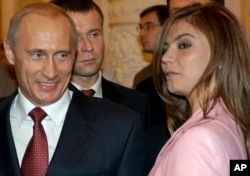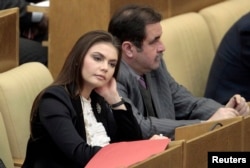Normally the delivery of twins is a cause for celebration — and when the head of government is one of the parents and the other is an aspiring politician it opens up the possibility for cute photo-opportunities. Not so in Russia under the command of Vladimir Putin, it would seem, where the private life of Russia’s leader is apparently off-limits, say analysts.
Rumors have been swirling for days in Moscow that the Russian leader’s reputed 36-year-old girlfriend, former Olympic gold medal-winning rhythmic gymnast Alina Kabaeva and now a media executive, gave birth to twin boys earlier this month in the Russian capital.
Nicknamed "the secret first lady," Kabaeva, three decades younger than Putin, was rumored in 2008 to have given birth to a daughter at a private Swiss clinic recommended by Italian politician Silvio Berlusconi.
Then, as now, the Kremlin has moved to scotch reports of the births. Putin, who guards his private life fiercely — possibly a habit from his days as a KGB agent — has long denied he is in a relationship with Kabaeva.
Asked once daringly about a possible romance, Putin responded: “I’ve always had a negative feeling about people poking their snotty noses and erotic fantasies into other people’s lives.”
In 2013, Putin announced the end of his 30-year marriage to wife Lyudmila Shkrebneva, with whom he has two grown-up daughters. He appeared in public for the announcement with his estranged wife, a former Aeroflot flight attendant and languages teacher, during the interval of a performance by the Kremlin Ballet. During their marriage, Shkrebneva, who since her divorce with Putin has remarried, kept a low public profile and her appearances were kept to a minimum.
The Kremlin moved swiftly last week to stop news stories of the delivery of twins, say media insiders — a further example of their strict management of top newspapers and news-sites, especially when it comes to coverage of Putin. In 2016, three editors at Russia's RBC media group, were fired over an article on the sources of Putin’s wealth in what media watchdogs feared would mark the demise of investigative reporting in Russia.
The website of newspaper Moskovsky Komsomolets, which is owned by one of the Russian leader’s oligarch friends, Arkady Rotenberg, reported the alleged Kabaeva births. But the report was quickly removed. Russian officials decline to comment.
But reports here and there on Kabaeva, an Uzbek by birth, have continued amid accusations by Putin loyalists that they are being encouraged by Ukrainian enemies of the Russian leader. One site, dni.ru, announced in a headline: “Alina Kabaeva gave birth to twins and disappeared.” A showbiz website, Dom2Life, which is owned by another oligarch close to Putin, Alexander Karmanov, first reported the births on May 12, Kabaeva's 36th birthday.
And according to Russian investigative journalist, Sergei Kanev, Kabaeva gave birth to twin boys by Caesarean at the Kulakov maternity clinic, where the VIP floor had been cleared in advance. He told Britain’s Daily Mail a doctor from Italy helped with the C-section delivery.
Kabaeva became a model on leaving competitive sport and was a Russian lawmaker until 2014. She now heads the National Media Group.
The mystery surrounding Kabaeva coincides with a further crackdown on the media in Russia amid rising complaints about shrinking press freedom and the Kremlin’s increasing determination to manage coverage.
Earlier this month, nearly a dozen journalists quit their posts at Kommersant, a liberal business-focused newspaper, and at one time a trailblazer for press freedom, in protest at the firing of two star reporters, Ivan Safronov and Maxim Ivanov. They co-wrote an article that ran afoul of the Kremlin, they say.
The newspaper is owned by billionaire Alisher Usmanov, another oligarch with close ties to Putin. One of the sacked reporters, Maxim Ivanov said on his Facebook page: “I’m no longer employed at the Kommersant publishing house. To avoid waxing lyrical: formally, my resignation from Kommersant is a mutual agreement between parties, but the decision to terminate my employment was made by the publishing house’s stakeholder.”
In March, another Kommersant journalist, Maria Karpenko, was fired over her reports on political developments in St. Petersburg.
The unfolding events at Kommersant have prompted the condemnation of the media watchdog and NGO Reporters Without Borders, which said in a statement May 20 that it is “dismayed” but the firings, dubbing them a “terrible blow to what is left of journalistic independence” in Russia.
According to The Bell, an independent news outlet, Kommersant had been accorded by the Kremlin some independence, unlike many rival outlets, “but is subject to censorship on political topics. The mass resignation of journalists will now call this arrangement into question.”
It added that “it is not entirely clear why the article [by Ivanov and Safronov] upset the authorities so much.” The story reported that Valentina Matvienko, the speaker of Russia’s upper house of parliament, would resign soon and be replaced by Sergei Naryshkin, the head of Russia’s foreign intelligence service.
Russian journalists fear the curtailing of editorial independence will only get stricter. In March, Putin signed new laws against the spreading “fake news” and showing “blatant disrespect” to the state with fines or jail sentences for offenders. Observers warned that the laws’ vague language could be abused to stifle free speech.


